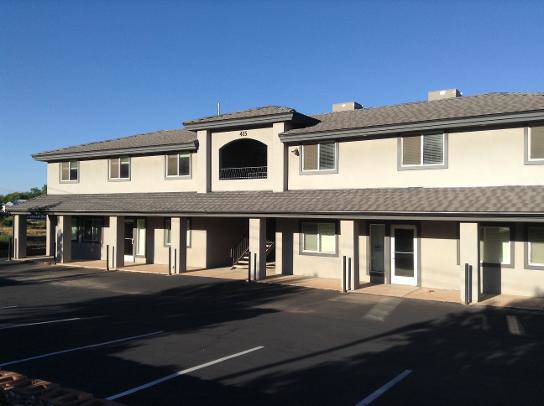 A recent transplant from northern New York, neuropsychologist Dr. Grace MacDowell opened Zion Peaks Wellness Center in August. The 1,200-square-foot facility offers full neuropsychological assessment, autism diagnosis, and autism treatment in specially equipped treatment rooms.
A recent transplant from northern New York, neuropsychologist Dr. Grace MacDowell opened Zion Peaks Wellness Center in August. The 1,200-square-foot facility offers full neuropsychological assessment, autism diagnosis, and autism treatment in specially equipped treatment rooms.
“Some of the most amazing people I have ever met.” Such was MacDowell’s description of individuals diagnosed with autism spectrum disorder.” In the 39 years that I have been interacting with and helping individuals with autism, I have come to understand that what we see on the surface are only the signs of the challenge. It does not truly represent who these people are, nor what tremendous potential lies within them.”
According to MacDowell, individuals with autism spectrum disorder can, with proper treatment, become quite successful in life.
“We shouldn’t think of autism as a doom-and-gloom, nasty lifelong diagnosis,” MacDowell said. “We should think of it as a special challenge that makes the individual deviate from typical development. From a neuropsychological perspective, that course can be altered dramatically, putting the individual back on the developmental track. The earlier we start, of course, the easier it is to do that. But we’ve seen impressive changes in individuals who start a sound, neuropsychological treatment program even after they are adults.”
MacDowell further explained what that kind of treatment includes.
“Neuropsychology is all about how behavior is related to and controlled by brain operation. Autism is perhaps the stereotypical example of how inefficiency in brain operation leads to challenged behavior,” she said. “The key is to do the kinds of activities that help the brain develop more efficient or more competent operation, including improved communication and cooperation between the different processing areas.”
“In other words, rather than try, via rote repetition, to give the child scripts for responding to his or her world, it’s far better to help that child come to understand how to interact independently, in a way that is fun and socially engaging,” she added. “The aim is not to control the symptoms; it’s to build the brain’s capacity to operate more neurotypically.”
“The end result is greater flexibility and independence than what is typically seen in individuals treated only by behavioral approaches,” she continued. “In the process, the child develops a full range of emotion, including the capacity for empathy and compassion. In other words, they become much less autistic and have greater capacity for healthy human interaction and relationships.”
Recently published research, conducted at York University in Toronto by Stuart Shanker, Ph.D., and James Stieben, M.D., showed that one particular therapy model, the “Developmental, Individual-difference, Relationship-based” (DIR) model helps to “rewire the brain” so that areas that are typically overreactive in untreated autism (such as the fear and anxiety processing areas) are quieted in favor of increased functionality in areas that were previously under-active (such as areas devoted to social competence). In some cases, the improvement was quite large.
Another recently published study conducted by Richard Solomon, M.D.’s PLAY Project team in Michigan showed that DIR can be successfully employed by parents and community members if properly trained. As a result, the typical 20 to 30 hours of therapy that children with autism need is much less expensive and produces much greater results. The research was underwritten by the National Institutes of Mental Health.
MacDowell’s own research, as an undergraduate at Southern Utah University in 2001, demonstrated that video modeling as a therapeutic technique is a viable tool for children with autism. Her research helped her win two national awards that year: the H. Y. Benedict Scholarship award from the Alpha Chi national honor society and a similar scholarship from USA Today for her place in the All-USA Academic First Team for 2001.
“The research indicated that the mirror neurons of the individual with autism are functional, meaning that these individuals can and do learn from self-observation,” she said. “Interestingly, the best result of the study was that each of the children who used video modeling to learn the assigned task independently and jubilantly expressed greater sense of self-efficacy and self-esteem at the end. I must stress, however, that it is just one tool in a good therapist’s hands, and is best used as part of a DIR-directed therapy.”
MacDowell works out-of-network and provides the insurance forms that her clients can submit to their insurance companies. Services are available by appointment only. Zion Peaks Wellness Center is located at 415 N. State Street in Hurricane. She can be contacted by calling (435) 359-3677.



